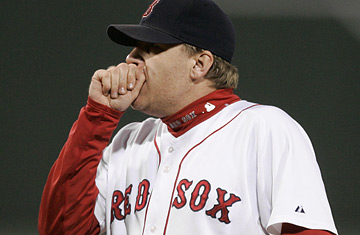
Red Sox pitcher Curt Schilling
As fans pick sides for this year's World Series between the Colorado Rockies and Boston Red Sox, Major League Baseball is rooting for just one thing: global warming.
In order to help boost ratings, baseball pushed back the start of this year's World Series to October 24, so the opening game could begin on a Wednesday instead of the usual Saturday start. The rationale is simple: More people are home watching prime-time television during the week, so why not play five of a possible seven games, instead of just three, on those days? "All the commissioner [Bud Selig] wants is to make sure baseball is viewed by as many people as possible," says Jimmie Lee Solomon, the executive vice president of baseball operations for Major League Baseball.
Perhaps as a reward for this revenue-producing strategy, the hardball gods stuck it to Selig by having teams that play in two of the coldest major league cities, Denver and Boston, advance to a Series that could creep into November. A seventh game, if necessary, would be played on November 1 at Boston's Fenway Park.
To critics, baseball is getting exactly what it deserves. The addition of the division series in 1995 already pushed the World Series even deeper into October, but now MLB is really tempting fate. And it's not as if there aren't alternatives; the regular season could start earlier, or be cut back to the old 154-game schedule, to allow the playoffs to unfold in the relative warmth of early-to-mid October. "It's a foolish thing," says former umpire Dave Phillips, who worked four World Series during a 32-year major league career that ended after the 2002 season. "Baseball is not meant to be played in those conditions. They're sitting on a time bomb. This could be baseball's worst nightmare."
At least as of now, the weather forecasts for Denver and Boston are not disastrous. "Our long-term models project higher-than-average temperatures, and lower-than-normal chance of precipitation," says Kyle Fredin, a meteorologist at the National Weather Service's Denver-Boulder office, of the games that would be played at Coors Field October 27-29. But remember, we're talking about the weather here. "In Denver, it's game on," says Fredin, recalling the blizzard of 1997 that fell before Halloween. "Anything goes here." In fact it snowed over the weekend in Denver, forcing the Rockies to practice indoors. Snow isn't likely to fall in Boston, but nighttime temperatures may fall into the 40s, not exactly ideal weather for the boys of summer.
And if the chill does set in for this Series, it will definitely change the game. "No doubt," says former major leaguer Orel Hershiser, who pitched for the Cleveland Indians in the 1997 World Series against the Florida Marlins. In that Series, temperatures fell into the 30s during the three games in Cleveland. Hershiser remembers carrying what he calls a "tool kit" to the mound in freezing temperatures. Since the cold dries out your hands, it's harder for a pitcher to grip the ball. To try to counteract that, Hershiser says he would poor water down his neck, under his uniform, in the dugout between innings. Then while out on the mound, he'd reach a hand under his collar to keep his hands wet.
Hershiser also recommends that pitchers wet their cotton underwear, since the water can seep through your pants. "It's like having a sponge out there," he says. Carrying a stick of sugarless gum in your back pocket can also help. Chewing gum creates saliva, which also helps your grip in the cold. "Lick your fingers, and wipe them off on your pants," says Hershiser. "But make it a fake wipe." But wait, isn't that a spitball? Hershiser says everyone does it, and the umpires let it go in the cold. "Look, you're just looking to recreate a normal environment," he says. "You're not gaining any kind of advantage."
Baseball fans, however, could gain one from the nippy weather. Too much of baseball is needlessly slow and drawn out these days, with both pitchers and hitters taking their time between pitches, but cold temperatures could change all that. Pitches know that if they don't work fast enough out there on the mound, the infielders and outfielders won't be very happy. "Get the ball, get back on the hill," Hershiser says. "Get the ball, get back on the hill. You don't want your fielders in a bad mood."
Frigid temperatures are no easier on the hitters. Jeff Conine, the recently retired 17-year vet who played for a Florida Marlins in that '97 series, remembers his contacts fogging up in the Cleveland cold. "I had to keep blinking to keep my eyes moist," he says. "This is a very bad thing. It was almost like a film was over my eyes." The eyes of other players tend to tear up in the frost, which makes if harder for them to see the ball.
Conine insists that the World Series adrenaline makes it easier for players to block out the cold than it would be for an early April regular season game. Still, "it's pretty miserable," he notes. Baseball can only hope that bad weather doesn't end up putting its TV viewers in the same kind of mood.
